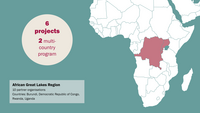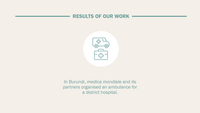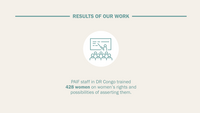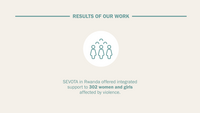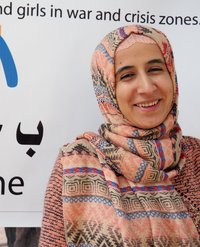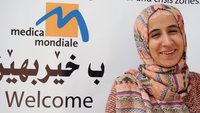Women's rights in East and Central Africa: Protecting women from sexualised violence
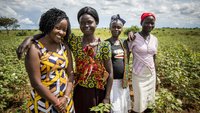
The Great Lakes region includes Rwanda, Burundi, Uganda, and the Democratic Republic of Congo (DRC). These are all countries whose populations have recently experienced bloody conflicts and wars, and in some cases are still experiencing them today. These conflicts, often taking place across borders, have causes which can be traced back to the colonial period. The main issues are territorial control, the exploitation of mineral resources, and claims to political power.
One particular flashpoint for armed conflict is the eastern part of DR Congo: since the 1994 genocide in neighbouring Rwanda, relations between the two countries have been strained. The Congolese government accuses Rwanda of supporting the largely Tutsi rebel group M23. There has also been a conflict between Uganda and the DR Congo for decades, which has caused violence to flare up time and again in the resource-rich areas of eastern Congo.
Sexualised violence is being used as a destructive weapon
In full view of the United Nations (UN) peacekeepers, sexualised violence is being used as a destructive weapon. Women’s rights activists are reporting rapes, slavery and human trafficking, forced marriages and sexualised violence within families or partnerships.
The riches of the region include coltan, gold, cobalt and other mineral resources, fuelling a thriving conflict economy that mainly benefits international corporations, politicians and military leaders. Enriched by this trade, conflict parties further enhance their capacity for conflict, making a sustainable peace solution more difficult.
Eight facts on women's rights in the region of the African Great Lakes
1. DR Congo: Conflict-related sexualised violence
In spite of several peace initiatives over recent years, for people in the DR Congo life is still plagued by violent conflict, flight, displacement and human rights violations. The number of cases of sexualised wartime violence against women and girls has been increasing dramatically since 2021. Perpetrators include those fighting in non-state groups, but also members of state security forces, soldiers of the Congolese army and members of the UN peacekeeping mission.
Millions of women fear violence every day: they face the threat of assault or rape while working in the fields, fetching water or searching for firewood. Almost six million people have fled from violence, but sexual assaults are often committed against those seeking refuge. Furthermore, refugee women generally also lose any opportunities they had to generate an income. In order to survive, many are forced into sexual exploitation in exchange for money or food for themselves and their children. Many survivors stay silent out of shame. Only a very few receive medical, psychological or material support.
2. Rwanda: Sexualised wartime violence and trauma
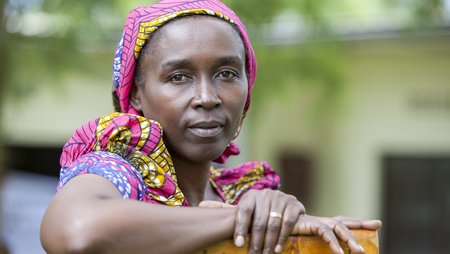
According to the UN, between 250,000 and 500,000 women and girls were raped during the 1994 genocide in Rwanda. Thousands of children were born after being conceived during these brutal attacks. The social isolation and ostracism of the survivors and their children affect their whole family. They are often excluded from active community life and left living in poverty and desperation due to their health problems and traumatic stress and lack of economic opportunities.
3. Uganda: Cast out and marginalised
Nearly every Ugandan woman over the age of 15 has experienced physical and/or sexual violence ¬– the figure is 95 per cent. Assaults increased during the Covid-19 pandemic, especially on minors. Within their social environment, most girls and women remain silent about the events since the stigma against survivors is too strong. Time and again, girls and young women are disowned by their families when they become pregnant, even if the pregnancy is the result of rape.
The shame of being regarded as “soiled” or “defiled” is also suffered by countless Ugandan women who were abducted by rebels during the armed conflicts since the early 1980s. They were held for months or even years, used as sex slaves, and repeatedly raped. Many of the survivors were left with unwanted pregnancies. They are often socially excluded, as are their children. This is still the case today.
4. Sexualised violence in everyday life
Unequal power relations are structurally and culturally anchored in each country’s society. Oppression and violence characterise the everyday life of many women in the region. In Burundi, for example, almost half of women experience intimate partner violence. In Rwanda, the figure is over 49 per cent. At the same time, the country is considered a pioneer in terms of women’s political participation: a quota system has been in place since 2005 to bring more women into leadership positions and the current proportion of women in parliament is over 60 per cent. However, this does not (yet) sufficiently protect Rwandans against sexualised violence as an everyday occurrence.
5. Gender-based violence: Simply because they are girls
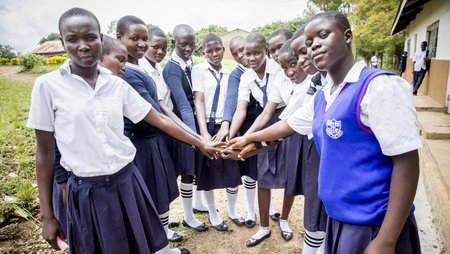
Girls are subject to a continuum of violence and disempowerment. For example, in Uganda almost one third of all girls are married before they reach the age of 18. At 25 per cent, the country’s rate of teenage pregnancies is one of the highest in the world. The girls affected generally have to abandon their schooling and any chance of education. In DR Congo and Burundi, sexualised violence is tolerated in schools, normalising violence against girls. Ophans, street children and members of ethnic minorities are especially at risk.
6. Structural violence and repression
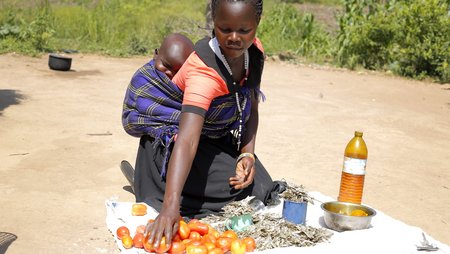
In the DR Congo and Burundi, family laws exacerbate discrimination against women and girls: In both countries, the man is seen as the head of the family. Women do not have the same inheritance rights as their male relatives and they have poor access to healthy food, especially in rural areas. Faced with patriarchal values and resistance, in Uganda there has been a failure to enforce reforms, such as one from 2021 intended to ensure more equal rights and protection from violence. Corruption and a weak legal system obstruct attempts to actually bring perpetrators to justice and compensate survivors.
7. Restricted access to healthcare provision
In the wake of long years of conflict and weak state structures, healthcare provision in the Great Lakes Region is very poor. Especially in rural areas there is a shortage of well-equipped clinics and medical specialists. As a result, many women and girls receive little or no care even for severe injuries following rape. In most cases they cannot afford the costs of transport to the nearest hospital, medicines or treatment. Inadequate medical provision and risky abortions also lead to high rates of maternal mortality and miscarriages.
8. Milestones in the fight against sexualised violence
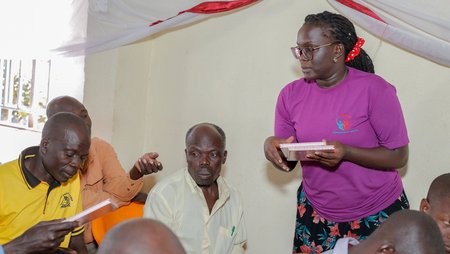
Networked regional women’s rights organisations have brought the issue of sexualised violence and its structural impacts into public awareness. It was their pressure which forced the countries in the region to accept important UN Resolutions on women, peace and security. Another important success was in 2006 as the International Conference on the Great Lakes Region passed a Protocol on the Prevention and Suppression of Sexual Violence against Women and Children. The objectives of the Protocol include ending impunity, protection from violence, and the provision of rehabilitation and support to survivors.
The heads of state of Burundi, Rwanda and, most recently, DR Congo (2021) launched the “Tolérance zéro immédiate” campaign to combat sexualised violence against women and girls. However, cooperation and implementation have been poor to date. There is a lack of effective law enforcement, including transnational enforcement, preventive measures or suitable support structures.
(Updated: 06/2023)
Facts & figures from our practical work
Please support this work by making a donation!
Partner organisations:
- Burundi: Mukenyazi Menya, Nturengaho, Dushirehamwe
- DR Congo: AFPDE, EPF, PAIF, RAPI, FRDP
- Rwanda: SEVOTA
- Uganda: MEMPROW
Project priorities:
- Public awareness work on violence against women and girls
- Integrated support for women and girls affected by violence
- Strengthening national and regional women’s rights work
Funding and funders:
- German Federal Ministry for Economic Cooperation and Development (BMZ)
- Brot für die Welt
- Deutsche Gesellschaft für Internationale Zusammenarbeit (GIZ GmbH)
- Medicor Foundation
- Leopold Bachmann Foundation
- EU via HNTPO/Consortium
- Dr. Dill Foundation
- Own resources
Source: Annual Report 2022
Focal points of work
The region of the African Great Lakes has been dominated by violent, cross-border conflicts for decades. Women suffer particularly from the high levels of ongoing violence. Our partner organisations are not only important points of contact for survivors: they also reach out to the women’s surroundings as well, raising awareness and creating long-term changes in the structures that actually give rise to this violence. The following strategic fields of action form the framework of our commitment to women's rights:
1. Preventing violence against women
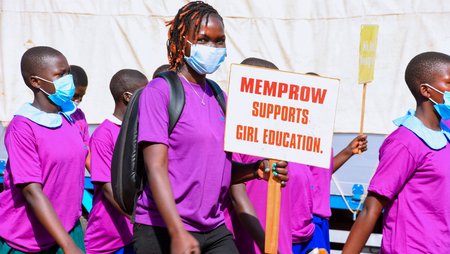
Advocacy and PR work for women’s rights
PR and advocacy work are important approaches for our partner organisations as they work to ensure the rights and protection of women and girls. For example, in Eastern Congo they train local authority and government agency staff, as well as managers, on how to implement measures that protect against sexualised and gender-based violence. They are also conducting a lobby campaign to bring about structural change against illegally charged court costs, which complicate the judicial processing of the cases. In Uganda, MEMPROW is calling on the government to increase the resources available for programmes to empower women and girls.
Breaking the cycles of violence
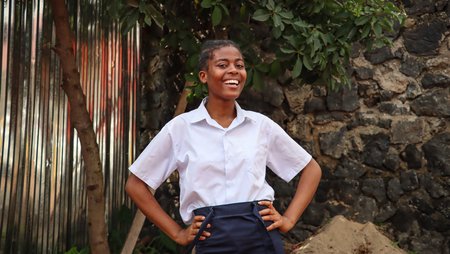
The cycles of violence cannot be broken unless both the causes and consequences of violence are tackled. So prevention of violence and support for women and girls affected by violence are both essential components of our projects. Our primary aim in supporting women and girls is to strengthen their self-confidence and their social status, in turn empowering them to question patriarchal social structures and defend themselves against violence. medica mondiale also supports the prevention work of the partner organisations. It consists of workshops and trainings in the social environment of the girls and women, among others with families, in schools or with the police.
Questioning power structures
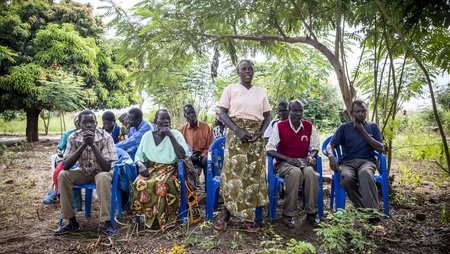
In Burundi our partner organisations are taking new paths in violence prevention. With the approach of SASA! (Kiswahili for ‘Now!’) adopted from Uganda, our partners draw attention to inequality in power structures, and the opportunities to change society in the long term. This creative method aims to enable people to take a critical look at power and gender relations, facing up to the causes of violence against women and girls and to look for solutions together.
2. Solidarity and support for survivors
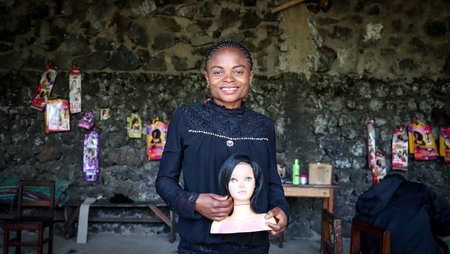
Holistic support for survivors of sexualised violence
The partner organisations of medica mondiale are often the first points of contact for survivors of sexualised violence. They offer integrated support. The counsellors empower the survivors in psychosocial counselling and where necessary refer the survivors on to healthcare centers for primary health care. If necessary, they refer them to lawyers, who follow up on the cases and bring them to court. Income-generating measures such as agricultural training or micro-credits also enhance the women’s economic independence.
Raising awareness for gender justice at community level
To bring about positive change, we mobilise key actors, such as village elders, women’s groups, parents, and teachers, to become active within their communities and commit themselves to equal rights and the protection of women and girls. This begins with supposedly small household chores such as fairly dividing up the water fetching.
Training professionals
Since 2021, experts from the region have been training specialist staff in healthcare institutions in Burundi and DR Congo on how to adopt the Stress- and Trauma-sensitive Approach (STA). In Uganda our partner organisation MEMPROW runs training sessions for police and court staff on stress- and trauma-sensitive interaction with survivors of sexualised violence. They are trained to become “change agents” who can contribute to lasting changes in standards and be- haviour in their communities. In this way, the team creates an environment where survivors receive integrated support and are able to stabilise.
"It encourages me in my work when the perception of health professionals towards survivors changes. Survivors of violence need appreciation and support to face their trauma."
3. Strenghtening feminist action
Strengthening and protecting activists
For our partner organisations, their work with survivors of violence can often be stressful and challenging. So self-care is an important aspect of project work with them. Regular supervision and training sessions help staff to guard against stress and deal with it better when it does occur. By offering feminist leadership training, we also empower women in management positions within civil society and government structures.
Women’s rights work in joint feminist initiatives
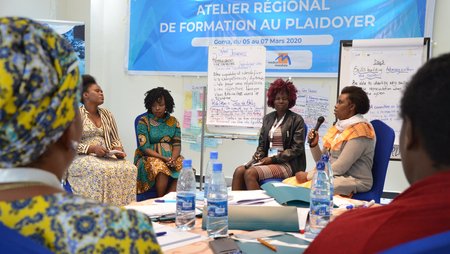
An end to violence against women and girls needs long-term changes in society. Progress towards this often fails because of a lack of political will and involvement. In order to ensure that the successes of the partner organisations spread beyond their local areas, medica mondiale is supporting them to network and become more professional. At the national level, in Burundi in 2022 they organised an exchange among 100 women from 31 women’s associations. Internationally, MEMPROW, SEVOTA and PAIF from Uganda, Rwanda and the DR Congo are in regular contact, sharing expertise and working on joint political strategies.
(Status focal points of view of: 08/2023)
News from Central Africa



